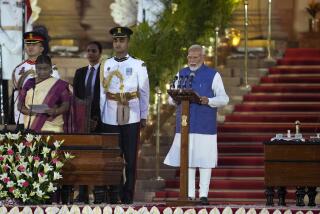In Close Vote, Pakistan Has New Prime Minister
- Share via
KARACHI, Pakistan — KARACHI, Pakistan -- A staunch ally of President Pervez Musharraf and the military was named prime minister by a narrow margin Thursday, but more tough political battles lie ahead in Pakistan’s deeply divided National Assembly.
The National Assembly elected Mir Zafarullah Khan Jamali, 68, a former chief minister of Baluchistan province, ending almost six weeks of bitter negotiations and three years of military rule. He immediately made it clear he will follow Musharraf’s path.
For the record:
12:00 a.m. Nov. 27, 2002 For The Record
Los Angeles Times Wednesday November 27, 2002 Home Edition Main News Part A Page 2 ..CF: Y 10 inches; 369 words Type of Material: Correction
Pakistani medal -- A story in Section A on Friday referred incorrectly to the Olympic Games at which Pakistan’s field hockey team won a gold medal with the front-office assistance of Mir Zafarullah Khan Jamali, the country’s new prime minister. It was the 1984 Los Angeles Olympics, not the 1996 Atlanta Olympics.
“My government will continue the policies of the last three years in which Pakistan has emerged as a front-line state in the war against terror,” he told legislators.
In a veiled warning to India, Jamali said he will maintain Musharraf’s hard line on security issues.
“We want good relations with our neighbors,” the new prime minister said. “Some of our neighbors want good relations, some don’t. But we are able to respond to any aggression. We have responded in the past and we will continue to respond.”
Opposition parties have accused Musharraf and the military’s powerful Inter-Services Intelligence agency of threatening and buying off politicians to ensure that the new civilian government is led by allies.
Jamali’s party is a breakaway faction of the Pakistan Muslim League. The PML’s leader, former Prime Minister Nawaz Sharif, was overthrown in Musharraf’s bloodless coup three years ago. Sharif and his family were exiled to Saudi Arabia.
Jamali’s pro-military, pro-Musharraf faction, the PML-Q, has 117 seats in the 342-seat National Assembly, far short of an outright victory.
He won the prime minister’s post Thursday with the support of smaller parties and maverick members of exiled former Prime Minister Benazir Bhutto’s Pakistan People’s Party.
Jamali polled 172 votes in the National Assembly, giving him a slight majority that will be hard to maintain as the new government confronts a long list of problems, including widespread resentment toward the U.S. search for suspected terrorists in Pakistan.
The country’s new prime minister is an avid sportsman, built like a barrel, who helped from the front office to lead the country’s field hockey team to a gold medal at the Atlanta Olympics in 1996. He’ll need a lot more than deft stickwork to survive the rough and tumble of Pakistani politics.
In a speech to the nation Wednesday night, Musharraf promised to hand over power to the new prime minister within two days.
Jamali’s shaky coalition government is required to prove its support in parliament in a confidence vote within 60 days.
Musharraf changed Pakistan’s constitution by decree and gave himself the power to dismiss the prime minister and parliament and oversee any civilian government with a national security council that he and other military commanders will dominate.
Musharraf seized power in October 1999, and then appointed himself president, confirming a new five-year term with a referendum in April of this year.
Musharraf, the only name on the referendum ballot, claimed 98% support in the vote, which was widely dismissed as a farce.
The opposition has accused him of violating the constitution by holding on to military power as the armed forces’ commanding general while serving as a civilian head of state.
“If Pervez Musharraf is serious in handing over power to the elected representatives, then he should announce his retirement from the post of army chief and withdraw all the unilateral amendments he made in the constitution,” said Qazi Hussein Ahmed, leader of an alliance of six Islamic parties.
The alliance, called the Muttahida Majlis-i-Amal, or United Council of Action, held the balance of power after none of Pakistan’s political parties won a majority in October’s national elections. The mullahs formed the third-largest bloc with 60 of the National Assembly’s 342 seats. They won strong support in several regions with an anti-U.S. campaign and then persuaded mainstream opposition parties to support hard-line cleric Maulana Fazlur Rehman for the prime minister’s post.
Rehman is barred from visiting the U.S. because of his anti-American and pro-Taliban rhetoric. When the hard bargaining for a coalition government began, he offered a more pragmatic approach to foreign policy if elected prime minister.
But when Bhutto’s party appeared close to forming a coalition government with the Islamic alliance, with Rehman as prime minister, Musharraf postponed the vote in parliament. The opposition called it a ploy to give his allies more time to build a winning coalition.
Ten dissident members of Bhutto’s party threw their support behind the pro-Musharraf bloc, claiming they wanted to ensure political stability. Bhutto’s PPP accused the members of bowing to pressure from Musharraf’s allies, and is threatening to expel them from the party.
Rehman’s Muslim alliance accused Musharraf of letting the U.S. meddle in Pakistani affairs. “By allowing the United States to set up its bases and allowing the FBI to conduct raids on Pakistani soil, President Musharraf has sold the independence of the country,” said Qazi Hussain Ahmed, another leader of the Islamic coalition.
More to Read
Sign up for Essential California
The most important California stories and recommendations in your inbox every morning.
You may occasionally receive promotional content from the Los Angeles Times.












